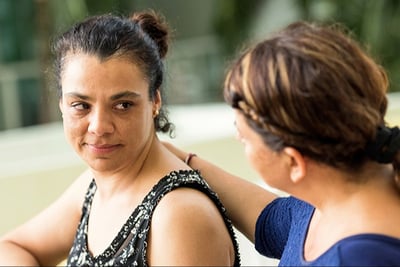Keyword: brca



Relevance: High
Most relevant for: People diagnosed with ovarian cancer
Article: How your ovarian cancer diagnosis can help your relatives
This media article provides tips from experts and the CDC for talking to family members after a diagnosis of ovarian cancer. It highlights which family members may be at risk of developing ovarian cancer or passing on genes that increase risk. The article provides links to resources, talking points, alternative methods of communication and potential reactions. (Posted 7/28/22)
Este artículo está disponible en español.
READ MORE ›


Relevance: Medium-High
Most relevant for: People with an inherited BRCA mutation
Study: Risk-reducing ovarian cancer surgery and quality of life
People with an inherited BRCA gene mutation are recommended to have surgery to remove their ovaries before the age of natural menopause to reduce their risk of ovarian cancer. This surgery can cause short-term and long-term effects. This study assesses the quality of life among people who have their fallopian tubes surgically removed and later have their ovaries removed compared to people who have their ovaries and fallopian tubes removed at the same time. (Posted 7/26/22). Este artículo está disponible en español.
READ MORE ›


Relevance: Medium-High
Most relevant for: Transgender men with an inherited mutation
Article: Breast cancer risk for transgender men with inherited mutations
There is little information related to the risks and treatment options for transgender men and nonbinary people who are at high-risk for breast cancer due to an inherited BRCA1 or BRCA2 mutation. We review an expert viewpoint on the implications of a BRCA mutation for transgender men undergoing breast removal as part of their gender-affirming care plan. (posted 5/19/22)
Este artículo está disponible en español.
READ MORE ›


Relevance: Medium-High
Most relevant for: People with inherited mutations in BRCA1 or BRCA2 who have been diagnosed with early-stage, HER2-negative breast cancer.
Study: Quality of life for people with early-stage breast cancer who participated in the OlympiA clinical trial
The OlympiA study showed that the PARP inhibitor olaparib (Lynparza) is effective when used as maintenance therapy for people with an inherited BRCA1 or BRCA2 mutation who have early-stage breast cancer. Patient-reported outcomes from OlympiA suggest that olaparib was well tolerated and did not reduce quality of life or delay recovery from chemotherapy. (posted 2/22/22) Update: Based on OlympiA results, the FDA approved olaparib as adjuvant treatment for people with an inherited BRCA mutation who were diagnosed with early-stage HER2-negative breast cancer at high risk for recurrence. (03/11/2022).
Este artículo está disponible en español.
READ MORE ›


Relevance: High
Most relevant for: People with BRCA1 or BRCA2 mutations
Study: Mutations in BRCA1 or BRCA2 may increase risk for endometrial cancer
A Dutch study added further evidence that women with a BRCA1 mutation may have an elevated risk for endometrial cancer. The study found that the endometrial cancer in women with either a BRCA1 or BRCA2 mutation was more likely to be an aggressive form of cancer associated with a poor outcomes. (posted 11/30/21)
Este artículo está disponible en español.
READ MORE ›


Relevance: High
Most relevant for: people with metastatic or recurrent cancer
Study: Genetic testing for inherited mutations may be helpful for all people with advanced or metastatic cancer
In a study of nearly 12,000 cancer patients with a variety of cancers, eight percent of participants with metastatic cancer had an inherited mutation in a cancer gene that qualified them for a targeted treatment approved by the FDA or for participation in a clinical trial. The majority of people with metastatic cancer were unaware that they had an inherited mutation, and had not receive gene-directed treatment to which their tumor may have responded. The study authors suggest that genetic testing for inherited mutations may be warranted for all patients with advanced or metastatic cancer. (posted 9/30/21)
Este artículo está disponible en español.
READ MORE ›


Relevance: High
Most relevant for: Non-Hispanic Black and white women with breast cancer
Study: Frequency of inherited mutations linked to breast cancer are similar in Black and white women
The CARRIERS study looked at the rate of inherited mutations in women with and without breast cancer. In an extension of the CARRIERS study, researchers found no difference in the frequency of inherited mutations in breast cancer genes among Black and white women with breast cancer. A few individual genes differed in frequency: BRCA2 and PALB2 mutations were seen more often in Black women, while CHEK2 mutations were seen less often. Researchers concluded that race should not be used to determine who is referred for genetic testing. (posted 8/13/21)
Este artículo está disponible en español.
READ MORE ›


Relevance: Medium-High
Most relevant for: People with early-stage HER2-negative breast cancer and an inherited BRCA mutation
Guideline: ASCO guidelines recommend olaparib for people with early-stage, high-risk breast cancer and an inherited BRCA mutation
The American Society of Clinical Oncology (ASCO) has updated their breast cancer treatment guidelines to include treatment with the PARP inhibitor olaparib (Lynparza) for one year after completing chemotherapy, surgery and radiation (if used) to improve outcomes of people with an inherited mutation in BRCA1 or BRCA2 with early-stage, HER2-negative breast cancer who have a high risk for recurrence. (posted 8/6/21) Update: Based on results from the OlympiA Study, the FDA approved olaparib as adjuvant treatment for people with an inherited BRCA mutation who have been diagnosed with early-stage HER2-negative breast cancer and are at high risk for recurrence. (03/11/2022)
Este artículo está disponible en español.
READ MORE ›


Relevance: High
Most relevant for: people with inherited PALB2 mutations
Study: Cancer risks of people with inherited PALB2 mutations
In the largest study of people with inherited PALB2 mutations to date, the gene was linked to increased lifetime risk of breast cancer in women and men, ovarian and pancreatic cancer but not prostate or colorectal cancer. (posted 7/1/21)
Este artículo está disponible en español.
READ MORE ›


Relevance: High
Most relevant for: Women who have had breast cancer who are considering pregnancy.
Study: Women can have safe pregnancies after breast cancer treatment
In a large analysis of all published studies to date, most women who become pregnant after breast cancer treatment had safe pregnancies, with no increase in their cancer recurrence risk. Infants of mothers treated for breast cancer were more likely to have low birth weight, preterm birth and small size at birth but there was no increase in birth defects. Breast cancer survivors who became pregnant had a similar risk of recurrence and survival as survivors who did not become pregnant. (posted 6/24/21)
Este artículo está disponible en español.
READ MORE ›